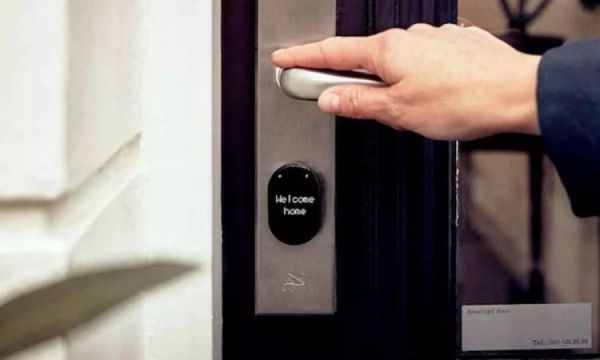
According to Mark Gurman of Bloomberg, Apple may soon revolutionize home security with a smart doorbell that uses Face ID. This new gadget, which is anticipated to be released by the end of 2025, would enable homeowners to open their doors just by glancing at them. According to reports, the doorbell would recognize homeowners and automatically provide admission, providing a smooth and safe experience, much like Face ID on iPhones.

The alleged usage of Apple’s Secure Enclave chip, which handles and stores biometric data independently from the main hardware, is a crucial component of the smart doorbell. This guarantees a high degree of security and privacy, which is consistent with Apple’s reputation as a company that values protecting customer data.
For consumers who are already committed to Apple’s ecosystem, the gadget may also interact with current HomeKit-enabled smart locks, making it a desirable option. As an alternative, Apple may collaborate with a top producer of smart locks to provide a comprehensive, integrated solution. According to reports, the “Proxima” chip—Apple’s own Wi-Fi and Bluetooth hybrid technology—will power the doorbell. This chip is also anticipated to be used in future HomePod Mini and Apple TV gadgets.
The “Apple Intelligence” program is the driving force behind Apple’s larger foray into the smart home market, which includes this project. The business is apparently working on additional cutting-edge home appliances in addition to the Face ID doorbell, such a 6-inch smart home hub with a display for playing films, controlling gadgets, and making FaceTime calls.
A security camera with a privacy emphasis is also reportedly in the works to go along with Apple’s expanding range of smart home appliances.
Although the idea of a doorbell with Face ID is convenient, it also raises concerns about possible security flaws. Risks including system failures or hacking efforts that might jeopardize home security have been brought to light by critics. Apple’s track record of creating safe and private devices, however, could allay these worries.
The smart doorbell is still in its early stages of development, but it shows Apple’s desire to take on well-established competitors like Amazon’s Ring. It may establish a new benchmark for smart home security if it is successful.
Doorbells are only one example of Apple’s inventiveness. Future gadgets such as a robotic arm-mounted display and an iPad-like smart display that magnetically affixes to walls or speaker bases are hinted to in reports. With the goal of giving its consumers a more natural experience, these initiatives highlight Apple’s dedication to building an integrated and approachable smart home ecosystem.